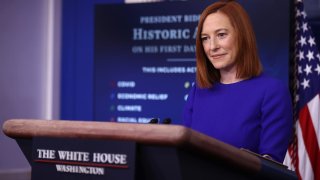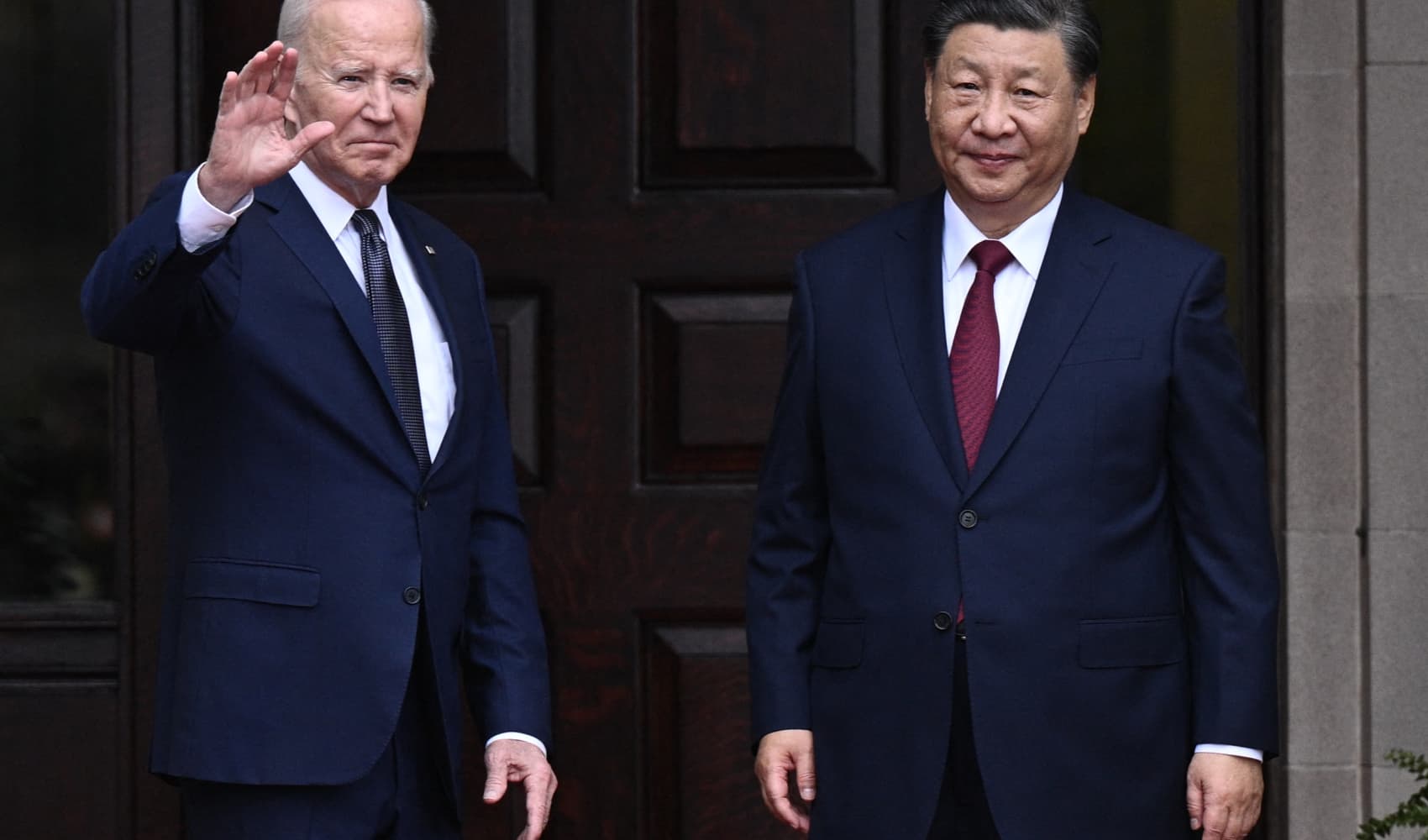
Four years ago, the Trump administration kicked off its turbulent relationship with the news media when press secretary Sean Spicer spent his first briefing boasting about inauguration crowd size — and he quickly became a target of mockery, including on "Saturday Night Live."
By contrast, the tone of the Biden administration's introduction on Jan. 20 was far less combative, led by new press secretary Jen Psaki, who told reporters she intended to help bring "truth and transparency back to government."
Three weeks in, Psaki's briefings have yet to spark SNL punchlines.
Psaki (pronounced SOCK-ee), 42, was picked for the high-pressure job by President Joe Biden following her eight years in and out of the Obama White House and campaign trail. Longtime colleague Jennifer Palmieri describes Psaki as approachable, friendly, unafraid to let her personality come through — and importantly, someone who gets "a lot of s--- done."
She's also not afraid to confront tension in the briefing room. Ultimately, she sees her role as repairing trust within the White House, with the press, and with the American public during a time of historic division and distress.
CNBC Make It spoke with Psaki about her first few weeks on the job and the mark she hopes to leave on the White House long after.
This interview has been edited for length and clarity.
Money Report
You're about three weeks into the new job. How are you feeling?
Like I know how to use my printer and I have voicemail on my phone. That is a big victory. [laughs]
No, I feel incredibly honored to be in this job. That was true the first day, and it's certainly true on day 19. There's still an awe I feel walking around the White House, even though I worked here before. I always tell people that if you don't feel that way, then it's time to leave. So it's safe to say I still feel that way three weeks in.
This is a big job. Why do you think you were tapped for it?
It's hard for me to speak to. When then President-elect Biden and Dr. Jill Biden and I talked about the role, we talked about the importance of aligning on tone and the unique moment that he is coming into the presidency and she's coming into the role of first lady, and anyone in the role of White House press secretary would be coming into. It's a moment where it's imperative to rebuild trust with the American public.
That means facing engagements and discussions you have with the press on facts, and trying to make policy cool again, and re-instilling a trust in the information coming out of the White House briefing room and from the press office. It doesn't mean that we don't push back on issues when needed. It doesn't mean I'm a wallflower or a shrinking violet. I don't think anybody who's ever had this job would be characterized in that way. We talked about the importance of really being mindful of this moment in history. We also talked about the South China Sea and a range of foreign policy issues because we both love foreign policy.
You were initially reluctant to take the role. Who did you talk to before accepting the offer?
To be clear, this job is an incredible honor to serve in. Anybody who's ever had it would say that, and that's certainly how I felt. I was not planning on going into an administration in large part because I have two little kids who are preschool age.
When I first started engaging with senior members of the team about this opportunity, I talked to my husband — not because I need his approval, it was 2020 — but because we are co-parents, and because I really wanted to take a step back and think about how this would be for my kids. This is a hard time, with Covid and the lack of normalcy. I thought, is this really the right time? But you don't know that this opportunity will come up again. So that was what I had to contemplate.
You've said being a mom shapes you as a leader and colleague. Why do you think that's important to share?
One, because I think it shapes how I think about things, just like anyone else's life experience shapes how they think about things and their job.
For me, when we talk about how we're going to reopen schools, I think about how I want my kids to be in school, but I want them to be safe. And are we explaining this to the public in the right way? And are my neighbors and friends with kids understanding what we're saying? Do we need to do it better?
I'm pretty unfazed by most things because I served in a prior administration on and off for eight years, but certainly compounding that with having two little kids offers an added perspective. Things don't go as you or your team planned.
I'm also mindful of valuing this opportunity I have and writing things down to tell my grandkids — remembering where I am sitting in a room where it's a moment in history, because I just have a different value for it.
What's President Biden like as a boss?
Those who watch him speak in public can see he's incredibly empathetic, a good listener and accessible. I feel I have become familiar to him for some time given I worked in the Obama-Biden administration, and I want to honor that he has this trust in me.
I also find he's somebody I can pose questions to or ask his view on issues. And he's quite open to providing that. He understands the value of the media and the value of the briefing. That makes my job easier. He also understands that sometimes we mess up and we have to fix it. That's valuable, too.
But the thing that will always stick with me is, when I talked with him about this job, at the end he said, 'How old are your kids again?' I said, 'Oh, they're 2 and 5.'
And he got very serious. He said, 'Listen, anyone who's worked for me for a long time will tell you, if there's anything you ever need to do for your kids, just go do it. You don't have to explain it. You don't have to worry about missing a meeting. There's nothing more important than family.'
Obviously, a lot goes on in the White House. But having that come from the top is incredibly powerful and freeing. I haven't had to utilize that at this point in time. But I have little kids, I'm sure I will. That told me a lot about who he is and what kind of a White House he wanted to oversee.
President Biden has a mantra of 'if you mess up, fess up.' When have you had to own up to a big mistake, and what did you learn from it?
First of all, anyone who says a lot of words in public will mess up sometimes.
I've only been doing this job a couple of weeks, and every day I walk out of the briefing room and think, 'I wish I would have said that one piece more clearly or articulated it more specifically.' And part of the job is always keep getting better, but also be humble about whether you're effectively doing your job and communicating with the public.
Last week, I was asked about the Space Force. This received a little bit of attention. I made a light quip about it, which was not meant to be making fun of the Space Force — it's a division of the military. I had a reaction, but I wish I would have just said, 'I'm happy to follow up with you and get you more information on it.'
To their credit, one of the leaders of the Space Force sent me a personal note and a pin. Now I have this pin, which I'm going to say is my lucky charm.
You learn that everything you say matters, which I always knew coming into this job. But even in times when you are trying to have a moment of light — and you have to look for those in the briefing room because there's a lot of serious moments — you have to be mindful about whether you're going to unintentionally criticize someone or something. That wasn't my intention, but that's how it came across. And you learn from those experiences.
You plan to be in this role for about a year. What do you hope to accomplish by then?
Part of my objective will be to help play a small part in a rebuilding trust in government, and that doesn't happen overnight. I'm not even sure it's going to happen in a year. But on my best days, I hope I can keep moving the boulder up the hill on that, because we are coming in from a series of years where that was destroyed.
I also am a policy nerd in my heart, and I want to make policy cool again. Part of my objective is to play a role in introducing some of the incredible policy experts and faces across government, cabinet members and people who are experts within the White House. We've had a bunch of people come to the briefing and answer questions. These are issues they're working on directly every single day. I think that sends an incredibly powerful message to the public about how committed government is to serving them.
The third piece is, part of what I strive to do is to help the people who work for me grow into their roles, grow in their own development, take risks and take chances. I hope that when I leave this job, that I have helped lift up another group of people — one of them is going to serve in this job I'm sitting in now. I hope I can play a role bringing a greater diversity of voices and faces and experiences to people who are serving as spokespeople on behalf of the White House and the government.
What kind of reputation do you hope to build as the face of the administration?
Serving in a senior role in the White House is a serious level of responsibility.
Everything that's said projects on the president and the administration. You can impact the market, foreign policy and diplomacy. There is a level of intense seriousness that I take to this job. But I also try to look for ways to bring joy into it, because it's an incredible honor to be in the job.
Government is hugely impactful. There are aspects of it that are exhausting. There are aspects of it that are fun. On my best days — I say that because some days it's not like this — I want my team to feel joyful in what we get to be a part of, because it's a unique opportunity, and everybody in the country doesn't have it.
And even on days we're working late, we should have that. So you get a lot done and try to find a little joy and happiness in your effort to do that. And remember it's an honor to be in these roles, even if you've been in them before. And even on your hardest day.
What's your morning routine?
I try to wake up in the fives, which a lot of people do. If I can, I try to exercise. But my daughter is 5, and she's got great ears, as I like to joke. So sometimes she'll hear me pitter pattering around the house and she wakes up early, too, and then we spend time together. So it just really depends on the morning.
I might flip through the morning news shows and see what I can consume. But having a 2-year-old and a 5-year-old, there's not a lot of just relaxing with a nice cup of coffee or leisurely reading the newspaper. That's not what happens in my house.
It's more about trying to have that time with my kids before I go to work, which depending on the day, is around 7 or 7:15.
What's your media diet?
I like to flip around all the networks and cables in the mornings — on my best days, as I like to say. I read collated news summaries and subscribe to some newspapers. I flip around online. It just really depends on the day. I try to consume a diversity of sources just to see how information we're putting out is consumed.
Then I check the news throughout the day because you want to see how things play, like how the president's event or how something I communicated plays, just to make sure it's hitting in the way you intended. It doesn't always. And if it doesn't, you've got to fix it.
What do you do to de-stress?
Spend time with my kids. As any working mom will tell you, there's not really time other than spending time with your kids and work. But there's nothing else that brings you back down to earth. When I get home, my son will want to tell me every intricate detail of his toy trains. And that's de-stressing in some way.
What issues keep you up at night?
We are coming into a White House at the moment of a pandemic where thousands of people are dying every day. I, as the press secretary, do not control the outcome of that. But like we all play a role in how information is communicated and whether people are understanding it, in terms of my personal responsibility, I think about that.
I remember the night before my first briefing, it was like 11 o'clock. And I said to my husband, "What if they asked me an in-depth question about Venezuela?" And he was like, "They won't."
Reporters can and should ask absolutely anything in the world they want to. What I think about is being as prepared as I can be and as clear as I can be, and doing the best I can to represent the views of the president.
And some days you leave the briefing feeling like, "OK, I did a pretty solid job." And sometimes you wish you would have done things differently. That's very specific to me.
Generally, when you're in the White House, you see the seriousness of the issues we're facing. And I think that's what keeps all of us up at night.
Check out:
Read Joe Biden’s 2014 memo to staff about making time for family: ‘This is very important to me’
Kamala Harris, Cori Bush and others who made history in the 2020 election
22-year-old Amanda Gorman is the youngest inaugural poet in U.S. history
Don't miss: The best credit cards for building credit of 2021






